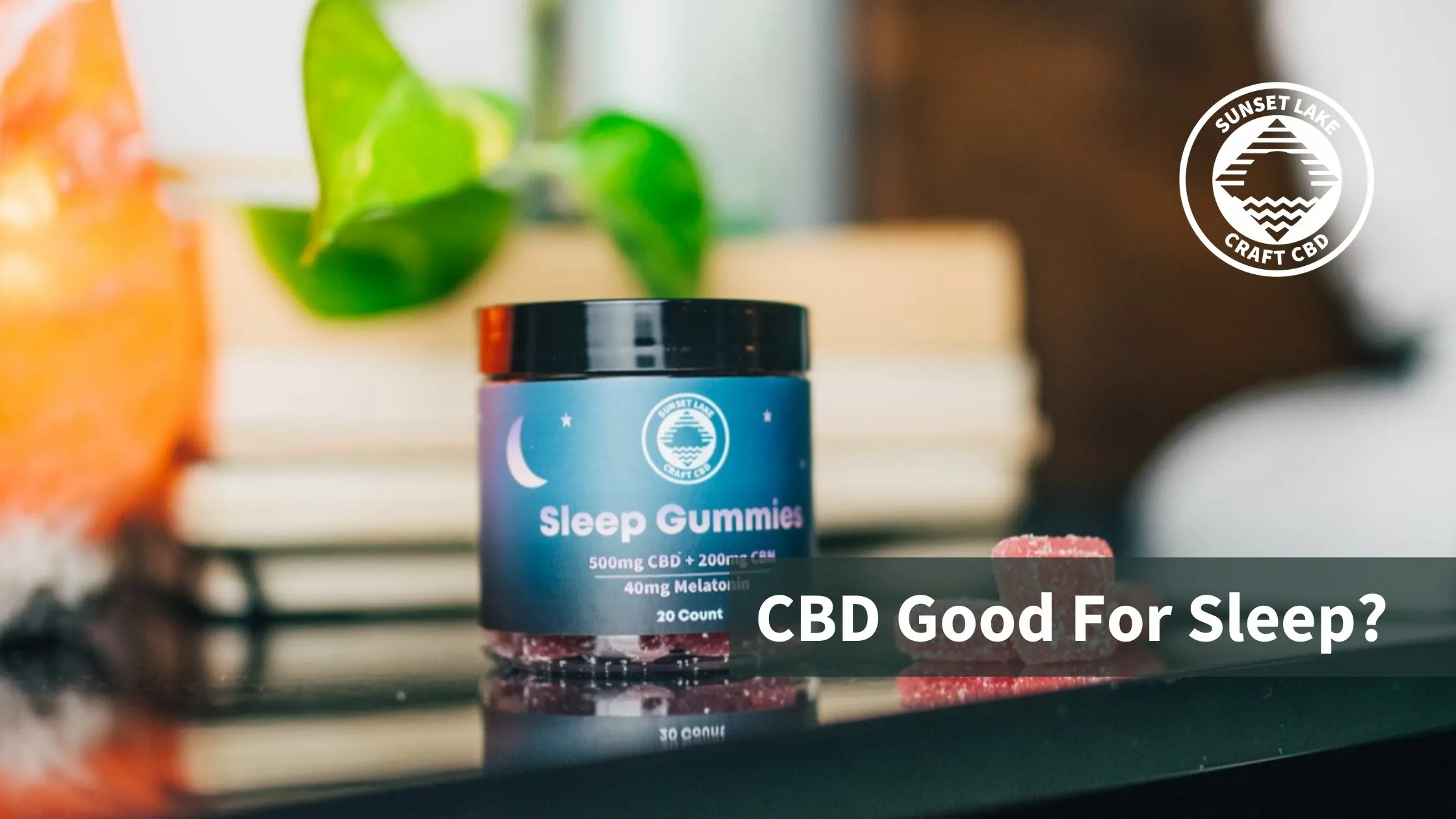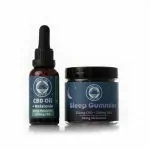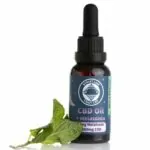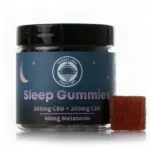No products in the cart.
CBD For Sleep: Can Hemp Make You Feel More Rested?

If you’re someone who has trouble getting eight hours of sleep every night, don’t worry, you’re not alone. In a recent survey, 70% of Americans reported not being able to get the recommended amount of sleep at night. If you’re one of these millions of Americans who have sleep-related issues, there’s a good chance you’ve tried just about everything under the sun (and stars) to reclaim some of your sleep. You may have even heard that CBD for sleep might be a credible option.
You may have some questions like,
- What is CBD?
- How do you use CBD for sleep? Is it effective?
- Are there side effects?
- And most importantly, does CBD for sleep work?
We’ll touch on those and more in the following piece.
What Is CBD?
CBD, short for cannabidiol, is one of the more than 100 known cannabinoids produced by the hemp plant. CBD is non-psychoactive, meaning that consuming it won’t make you feel intoxicated or “high.”
Because CBD doesn’t make users feel intoxicated or “euphoric,” the World Health Organization has stated that “…CBD exhibits no effects indicative of any abuse or dependence potential…” meaning that as far as we know, it’s not possible to become physically addicted to CBD.
So what exactly does CBD do? Check out our piece on CBD and how it interacts with your body here.
Disclaimer: This piece was written for purely informational purposes. The efficacy of CBD has not been confirmed by FDA-approved research. CBD is not intended to diagnose, treat, cure, or prevent any disease. There is no guarantee that CBD will help you get to or stay asleep.
CBD for Sleep
While the FDA has only approved the CBD-derived anti-seizure medication, Epidiolex, the results of a recent study published in the Journal of Cannabis Research would suggest that many CBD users are utilizing CBD to help manage sleep issues; 42.5% of survey respondents said that they used CBD to “improve sleep quality” or for self-perceived insomnia.
In that same study, participants were asked “How does CBD affect your sleep?” Nearly 40% of respondents said, “[they] sleep better.” While FDA-backed research on CBD for sleep may be behind, these responses are promising for folks looking to introduce CBD into their nighttime routine.
Current CBD for Sleep Studies
There are several ongoing into using cannabinoids and CBD for sleep disorders.
- Dronabinol – Early research suggests that this synthesized version of THC may help with obstructive sleep apnea. But at this early stage, professionals are hesitant to recommend the use of cannabis products to alleviate sleep apnea or any other sleep disorders.
- Nabilone – Another synthesized version of marijuana used primarily as an anti-nausea drug by chemotherapy patients. Some studies have shown that nabilone may help those suffering from posttraumatic stress disorder (PTSD) have fewer nightmares, and in turn help them get a more restful, deeper sleep.
- CBD – Research is still in the early stages, but CBD for sleep disorders is showing a lot of promise. Early findings suggest that CBD might help alleviate disorders like insomnia, REM sleep behavior disorder, and excessive daytime sleepiness disorder.
Read more: CBD and Adenosine: Understanding Their Interaction
Now would be a good time to add our disclaimer: This piece was written for purely informational purposes. The efficacy of CBD has not been confirmed by FDA-approved research. CBD is not intended to diagnose, treat, cure, or prevent any disease. There is no guarantee that CBD will help you get to or stay asleep.
Does CBD Let You Sleep?
While experts are still uncertain about CBD’s relationship to sleep, many believe that it’s possible that CBD plays a role in getting better quality sleep by addressing the root causes of restlessness.
Many factors can cause you to have poor-quality sleep, or not get enough sleep. According to the Mayo Clinic, poor sleep can be caused by:
- Mental health disorders like anxiety, depression, and PTSD.
- Medications that can disrupt your sleep-wake cycle.
- Physical discomforts like pain and restless leg syndrome.
- Caffeine intake later in the day.
- Your surroundings. Do loud noises or lights wake you up in the middle of the night?
Many professionals and current users consider CBD helpful in addressing some of the factors listed above— namely anxiety and physical discomfort.
In the aforementioned Journal of Cannabis Research study, 42.6% of users reported that they used CBD to help with anxiety. Nearly 20% said that they used CBD to help with arthritis and joint pain.
CBD is thought to help users relax without the psychoactive high common with traditional marijuana. When someone is relaxed, they are less likely to have racing thoughts or are less likely to be bothered by aches and pains. It makes sense as to why users report better sleep as not just a desired outcome of CBD use, but as a welcome side effect too.
Related: CBD & Circadian Rhythm: Can CBD Help Get You Back On Track?
How to Find CBD for Sleep
A full night’s rest isn’t something anyone wants to leave up to chance. But there are so many CBD sites out there selling ‘nighttime’ drops or ‘relax’ gummies. How can you know that you’re buying from a trustworthy vendor?
There are a few green flags you’re going to want to look for.
Website Smell Test
Think of an eCommerce store as a salesperson. The first question you should ask yourself is: Can I trust them? For many of us, it’s a gut reaction.
Use those same instincts here. If the CBD vendor’s website doesn’t look trustworthy and is pestering you with endless, tangentially related popups, don’t bother with them. However, if you’ve found a site that you like and trust…
Find Their Certificates of Analysis
A certificate of analysis, or COA for short, is a document from an accredited third-party lab that confirms that your hemp product meets advertised specifications. COAs tell you a few things, most importantly the concentrations and variety of cannabinoids present in your product.
Certificates of analysis are important and should be included with every CBD purchase because…
- They ensure that your product contains advertised levels of CBD.
- Certificates of Analysis should also list any other relevant cannabinoids in your product.
- This includes CBN, generally thought of as another cannabinoid that promotes relaxation and restfulness.
- They indicate whether or not the cannabis (product) in question is federally-legal hemp or a federally-prohibited cannabis product.
- Products with over 0.3% delta-9 THC by dry weight are considered to be THC cannabis.
- Depending on how your product is advertised— full-spectrum, broad-spectrum, THC-free, etc.— the presence of additional cannabinoids may raise an eyebrow.
Curious to see Sunset Lake CBD’s certificates of analysis? You can see them here.
Customer Reviews
Before you press that “Buy Now” button, take a look at customer reviews, both on and off the website. It may turn out that previous buyers have extra insight into how best to use the product, some tips on dosing, or, in worst-case scenarios, you may find out that the product in question may not help with sleep at all.
How Much CBD For Sleep?
There are a lot of factors that play into what your ideal CBD dosage will be. If you’re new to cannabis or CBD products, be sure to talk to your doctor or pharmacist about any potential prescription drug interference CBD may cause.
We here at Sunset Lake CBD always recommend starting with a lower dose and working your way up once you’re acclimated. Start with 25mg per night and stick with that amount for at least a week. If you notice that your 25mg dose isn’t delivering the relaxation that you want, gradually increase your dose over time until you find a level that works for you.
What Is the Best Way to Take CBD for Sleep?
CBD can come in several forms. Below are several more common forms:
Oral liquids – CBD Oil Tinctures and Mouth Sprays.
Oral liquids are nice because they are generally well-homogenized, meaning that your dosing will be very consistent. For example, Sunset Lake CBD’s 1,200mg CBD Oil Tincture + Melatonin is designed so that you’ll get 40mg of CBD and 3mg of melatonin in every 1mL dose. Oral liquids can take approximately 15-45 minutes to set in.
Edible items – Infused foods and beverages.
Edibles will take the longest to kick in (1-2 hours,) but will last longer because of how your digestion system works. The dosing may not be as consistent as oral liquids but will be within the margin of error.
Topicals – Targeted relief to sore areas, not to be ingested.
Unlike oral liquids and edible items, topicals will not bring you a general feeling of relaxation, rather they’re for relieving a targeted area. For example, if your biggest hindrance to a restful evening is a sore knee, try rubbing down that area with a CBD topical. Unlike oral liquids and edible items, CBD topicals tend to start working almost immediately.
Smokables – CBD Flower, prerolls, and kief
Because of how inhalation and CBD ingestion works, smokables will kick in the fastest. So if you’re looking for relief now, smokable CBD may be the way to go. That said, smokable CBD will also “wear off” the fastest because it will be metabolized faster than any other method.
What Strain of CBD Is Best for Sleep?
While CBD’s link to sleep is purely anecdotal, so too are flower strains’ links to desired effects. That said, some believe that Indica-dominant strains, like Sunset Lake CBD’s Cherry Abacus flower, are better for general relaxation and nighttime use.
Timing Is Everything
Regardless of your method of ingestion, if you plan on using CBD for sleep, you’ll want to time your dose correctly. Take your dose, especially if your CBD product contains the sleep-aid melatonin, one to two hours before bed.
This little buffer will allow the CBD to do its part relaxing you and the melatonin hormone to communicate that it’s time to sleep with the rest of your brain.
Sunset Lake CBD + Melatonin Sleep Products
Practice Good Sleep Hygiene
Don’t rely solely on CBD to get to sleep as it isn’t a silver bullet for sleep disorders. Practicing good sleep hygiene is also a must to getting consistent, quality sleep.
According to the Sleep Foundation, “sleep hygiene” is a way to refer to a set of good sleep habits including,
- Consistency – Going to bed at the same time every night and getting up at the same time each morning. (This includes weekends!)
- Electronics – Remove electronic devices like televisions, computers, and phones from your bedroom.
- Environment – Make sure that your bedroom is quiet, dark, and is a cool but comfortable temperature.
- Activity – Try to be physically active during the day, even if just for 20 minutes. Expended energy can help you fall asleep more easily at night.
- Diet – Avoid big meals and caffeinated beverages before bed. (Afternoon coffee drinkers lament.)
Other Frequently Asked CBD Questions
Is CBD Legal?
A sticky question to be sure. As of this writing, CBD derived from hemp as defined in the 2018 Farm Bill as “cannabis that contains less than 0.3% THC,” is federally legal. That 0.3% limit refers to the weight of a dried product.
CBD and hemp products that test under that limit are considered by the USDA to be an agricultural commodity and legal throughout the United States and its territories, provided that the vendor has the correct paperwork.
What about on a state-by-state basis? Good question. Refer to our piece about CBD legality here.
Is CBD Safe?
CBD is generally well-tolerated by most, but that doesn’t mean that you won’t experience any side effects. Some of the most commonly reported are:
- Change in appetite
- Diarrhea
- Nausea
- Dizziness
- Upset Stomach
- Weight change
Note that the side effects listed above are from short-term use. Because of CBD’s relatively short-lived prominence, we have yet to observe any side effects from long-term use.
Is Melatonin Safe?
Your body produces melatonin naturally. But that doesn’t mean that you should throw caution to the wind while taking melatonin supplements.
Avoid using products with melatonin if you are pregnant, breastfeeding, or have an autoimmune disorder, seizure disorder, or depression. Melatonin supplements have been known to raise blood sugar levels and increase blood pressure levels in people who take some hypertension medications.
Is CBD Going to Interact With Other Medications?
Ask your doctor, or better yet your pharmacist. CBD can interact with other prescriptions. Specifically, CBD can slow down your liver’s ability to break down certain medications.
Takeaways: Does CBD for Sleep Work?
Not getting enough sleep can impact every part and facet of your life, from your immune system to your ability to lose weight. If you have struggled with your sleep, you know that some days are better than others. If only there was a way to ensure more of those better days.
While CBD products, and especially CBD products containing the sleep-aid melatonin, may help you relax and ease into sleep, they are not a cure-all. If you plan on using CBD for sleep, understand that you should integrate it into your sleep routine and you should not rely solely on it to ensure a good night’s rest.
If your sleep problems persist, there may be other underlying causes that you may need to address with a medical professional.
Sources
- Moltke, J., Hindocha, C. Reasons for cannabidiol use: a cross-sectional study of CBD users, focusing on self-perceived stress, anxiety, and sleep problems. J Cannabis Res 3, 5 (2021). https://doi.org/10.1186/s42238-021-00061-5
- Alger, Sara E et al. “Challenging the stigma of workplace napping.” Sleep vol. 42,8 (2019): zsz097. doi:10.1093/sleep/zsz097
- Chagas, M H N et al. “Cannabidiol can improve complex sleep-related behaviours associated with rapid eye movement sleep behaviour disorder in Parkinson’s disease patients: a case series.” Journal of clinical pharmacy and therapeutics vol. 39,5 (2014): 564-6. doi:10.1111/jcpt.12179
- Babson, Kimberly A et al. “Cannabis, Cannabinoids, and Sleep: a Review of the Literature.” Current psychiatry reports vol. 19,4 (2017): 23. doi:10.1007/s11920-017-0775-9
- Murillo-Rodríguez, Eric et al. “Potential effects of cannabidiol as a wake-promoting agent.” Current neuropharmacology vol. 12,3 (2014): 269-72. doi:10.2174/1570159X11666131204235805
- Cowling, Tara, and Danielle MacDougall. Nabilone for the Treatment of Post-Traumatic Stress Disorder: A Review of Clinical Effectiveness and Guidelines. Canadian Agency for Drugs and Technologies in Health, 20 February 2019.
- Pacheco, Danielle. “Is Cannabidiol a Safe and Effective Sleep Aid? | Sleep Foundation.” Sleep Foundation, OneCare Media Company, 4 May 2021, https://www.sleepfoundation.org/how-sleep-works/cbd-and-sleep.
- “Farm Bill | USDA.” USDA, https://www.usda.gov/farmbill. Accessed 9 Feb. 2022
- Melville, Nancy A. “Cannabinoid May Be First Drug For Sleep Apnea.” Medscape, Medscape 25, Jan. 2018, https://www.medscape.com/viewarticle/891821
- “Insomnia – Symptoms and Causes – Mayo Clinic.” Mayo Clinic, 15 Oct. 2016, https://www.mayoclinic.org/diseases-conditions/insomnia/symptoms-causes/syc-20355167
- University of Pennsylvania School of Medicine. “Nearly 70 percent of cannabidiol extracts sold online are mislabeled, study shows: Mislabeling may lead to adverse effects for patients, including children with epilepsy.” ScienceDaily. ScienceDaily, 7 November 2017. www.sciencedaily.com/releases/2017/11/171107112244.html
- “Melatonin for Sleep: Does It Work? | Johns Hopkins Medicine.” Johns Hopkins Medicine, Based in Baltimore, Maryland, https://www.hopkinsmedicine.org/health/wellness-and-prevention/melatonin-for-sleep-does-it-work. Accessed 9 Feb. 2022.
- Ferguson, Sian. “CBD for Insomnia: Can It Help?” Healthline, Healthline Media, 1 Aug. 2019, https://www.healthline.com/health/cbd-for-insomnia.



